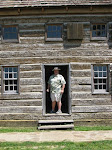Born in that most magical city, Savannah, I was allowed to run wild in that earthly paradise until I was nine: ideal for the boy who early decided he wanted to write.
Every year it is a pleasure to commemorate the birthday of a favorite author, Conrad Aiken, from one of my favorite places, Savannah, Georgia. Conrad Potter Aiken was born in Savannah in 1889 and lived in an elegant townhouse on Oglethorpe Avenue across the street from Colonial Cemetery. He often played in that ancient burial ground midst tabby crypts and tombstones where the mortal remains of many of Georgia's aristocracy found rest. From the time he was eight or nine he wanted to be a poet. Soon he found himself captured by the works of Edgar Allan Poe and happily sharing the terror with his brother and sisters. He seemed destined for happiness surrounded by wealth, privilege, and pedigree but all was not well. One day, when he was eleven, he returned home to find his mother shot to death, his father dead by suicide. His world changed forever that day and he would never fully recover from the horror he saw.

He went to live with relatives in New England and later became a successful student at Harvard under the guidance of philosopher and writer, George Santayana. There, he also established what would become a life-long friendship with fellow student, T. S. Eliot.
Aiken wrote lyrical poetry, weighted with symbolism and psychological exploration so deep that, in his own words, "Freud was in everything after 1912." By 1920, he moved predominantly to prose expressing his "faith in consciousness" and an endless search for knowledge as the means to quell his personal chaos and bring order and structure to the larger consciousness of the world. Despite a 1930 Pulitzer Prize for his collected poems, Aiken never received wide recognition for over thirty years until he settled in his city of his birth. Several character traits kept him from the public eye. To begin, he was deeply introverted to the point of being clinically shy and avoiding reading his work in public. Furthermore, he chose to be a most candid critic, a posture that did not endear him to his fellow writers. And finally, during his middle years, he was a resident of both the United States and Europe and never quite on either continent long enough to have the intellectual salons claim him as one of their own.
By 1960, readers and critics "rediscovered" him after he had been resident in the U.S for some years. Beginning in 1962 he returned part-time to the elegance of Savannah where he spent the winters living next to his boyhood home. For the next eleven years he was the focus of social and academic circles there and sought out by admirers until his death in 1973.
If readers want to learn more about Aiken and his world, I strongly recommend they read this interview published in The Paris Review in 1963.
During his career he wrote or edited fifty books, including his poetry, short stories, five novels, and one autobiography. While much of Aiken's poetry is freely available on line his prose is not; however, one of his most famous semi-autobiographical short stories about Savannah and Tybee Island, Strange Moonlight, is available here. In its few pages the story bears the full range of hallmarks - symbolism, consciousness, endless search, struggle, need for resolution - in his work.

Ruinous blisses, joyous pains,
Life the destroyer, life the breaker,
And death, the everlasting maker....
Even in death Aiken reinforced his personal struggle as a legacy. On a visit to Savannah's magnificent Bonaventure Cemetery you'll eventually arrive at Aiken Way. At it's end there's an eerie headstone bearing the identical death dates of his parents. Next to it is a memorial bench he installed before his death. It bears the inscription "Cosmos Mariner - Destination Unknown." Aiken found his epitaph quite by accident while perusing the daily list of port activity - names, arrivals and departures, ports of origin and destination - appearing in the Savannah newspaper. It was a perfect fit for a restless, constant searcher forever sailing through an uncertain sea. But not to be one without hope, he engraved the directive, "Give my love to the world" beneath the epitaph. I think it's a rather confident wish coming from a restless sailor. We can pray that every man should find safe harbor, all the while knowing that we are not the final judge of his navigation. And so, in Conrad Aiken, we are left merely to explore the products of a shy and troubled man who could appreciate a bawdy pun and have his say in singing words and lilting prose.

Sources
Text:
The New Georgia Encyclopedia, Conrad Aiken, entry by Ted R. Spivey
Wikipedia entry, Conrad Aiken
Conrad Aiken: Prodigy Unitarian Poet, by Richard A. Kellaway
opening quote is from Aiken's autobiography

Sources
Text:
The New Georgia Encyclopedia, Conrad Aiken, entry by Ted R. Spivey
Wikipedia entry, Conrad Aiken
Conrad Aiken: Prodigy Unitarian Poet, by Richard A. Kellaway
opening quote is from Aiken's autobiography
"ruinous blisses" quote is from his 1916 poem, The Dance of Life.

No comments:
Post a Comment